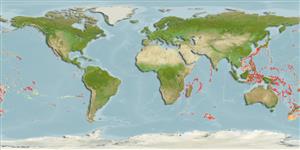>
Anguilliformes (Eels and morays) >
Nettastomatidae (Duckbill eels)
Etymology: Nettastoma: Greek, netta = duck + Greek, stoma = mouth (Ref. 45335); solitarium: From the Latin solitarius meaning solitary, alone, lonely, in reference to the isolated and widely scattered distribution of this species in the Indo-Pacific..
Environment: milieu / climate zone / depth range / distribution range
Ecologia
marinhas bentopelágico; intervalo de profundidade 415 - 610 m (Ref. 40819). Deep-water
Indo-West Pacific: Kyushu-Palau Ridge, the Philippines, Australia, and the western Indian Ocean (Ref. 559). Reported from the Hawaiian Islands (Ref. 58302).
Tamanho / Peso / Idade
Maturity: Lm ? range ? - ? cm
Max length : 46.5 cm TL macho/indeterminado; (Ref. 40819)
Descrição suscinta
Chaves de identificação | Morfologia | Morfometria
Six supraorbital pores, SO5 present. Lateral line pores 42-45. Median vomerine teeth somewhat enlarged. Posterior nostril above anterodorsal corner of eye.
Recorded on video tape outside the coelacanth caves at a depth of 278-340 m (Ref. 58472).
Ciclo de vida ou comportamento de acasalamento
Maturities | Reprodução | Spawnings | Egg(s) | Fecundities | Larvas
Paxton, J.R., D.F. Hoese, G.R. Allen and J.E. Hanley, 1989. Pisces. Petromyzontidae to Carangidae. Zoological Catalogue of Australia, Vol. 7. Australian Government Publishing Service, Canberra, 665 p. (Ref. 7300)
Status na Lista Vermelha da UICN (Ref. 130435)
Ameaça para os humanos
Harmless
Uso pelos humanos
Ferramentas
Relatórios especiais
Baixar XML
Fontes da internet
Estimates based on models
Preferred temperature (Ref.
123201): 2.3 - 11.5, mean 8.5 °C (based on 154 cells).
Índice de diversidade filogenética (Ref.
82804): PD
50 = 0.5312 [Uniqueness, from 0.5 = low to 2.0 = high].
Bayesian length-weight: a=0.00089 (0.00036 - 0.00223), b=2.98 (2.77 - 3.19), in cm total length, based on LWR estimates for this (Sub)family-body shape (Ref.
93245).
Nível Trófico (Ref.
69278): 3.4 ±0.5 se; based on size and trophs of closest relatives
Resiliência (Ref.
120179): Baixo, tempo mínimo de duplicação da população 4,5 - 14 anos (Assuming tmax>10).
Fishing Vulnerability (Ref.
59153): Moderate vulnerability (37 of 100).
